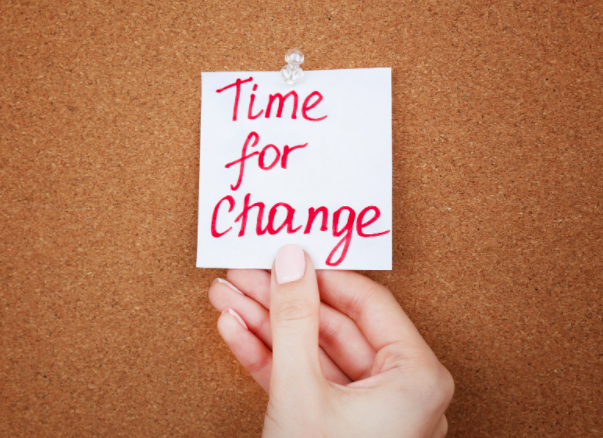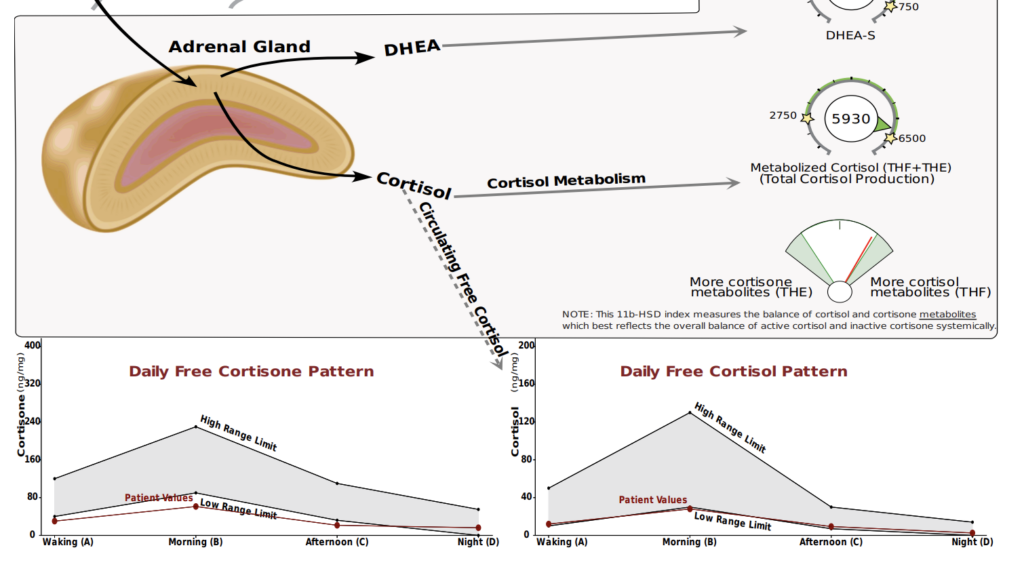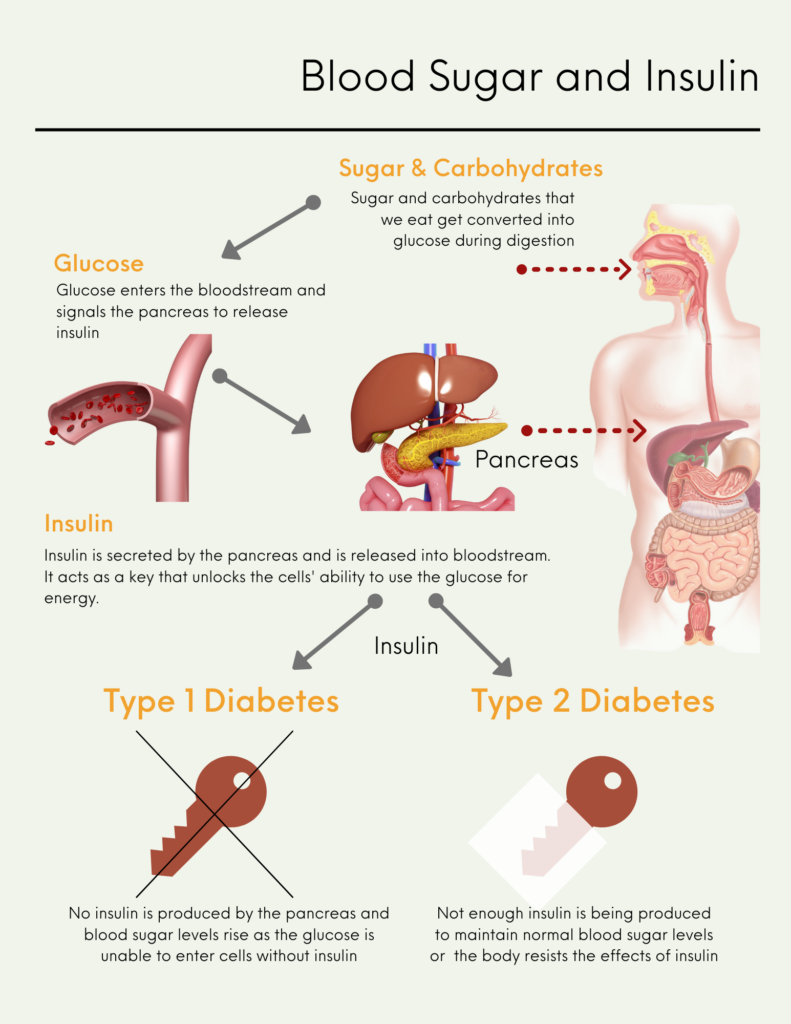Blood Sugar Management and Hormone Balance
What is blood sugar?
Blood sugar, also known as glucose, is the main source of energy for your cells. It’s carried in your bloodstream from the food you eat. Your body needs to keep blood sugar levels within a healthy range to function properly. Sugar has an incredibly detrimental affect both on the digestive system as well as on the endocrine system. When your blood sugar is too high or too low, it can cause serious health complications including hormonal imbalances that can lead to infertility and pregnancy complications.
What is insulin?
Insulin is a hormone produced by the pancreas that helps regulate blood sugar levels by storing excess glucose in the liver, fat and muscles that can then be used as energy when the body needs it. When glucose is stored away, blood sugar levels decrease thus cueing your pancreas to hault production of insulin. Healthy insulin levels are important for hormonal balance and fertility so when insulin levels become too high or low, it can affect other hormones as well as ovulation and fertilization. If insulin resistance becomes severe it can cause infertility.
What is insulin resistance?
For a myriad of reasons, cells in the liver, fat and muscles can become “resistant” to insulin. In other words, these cells say to insulin “We have closed up shop. You can’t store your glucose here.” Oftentimes this is as a result of a long-standing high carbohydrate, low fat and low fiber diet. Over time the pancreas can not make enough insulin to overcome the cells “resistance” which leads to insulin resistance and abnormal blood sugar levels.

As glucose levels spike over and over again, we gain more and more weight and – more and more free radicals are produced. Under this continued pressure, the body shifts into an oxidative state which leads to metabolic disease, hormone imbalances, heart disease, type 2 diabetes, cognitive decline and general aging.
“Over decades cells become ravaged. Because they’re stuffed, crowded and overwhelmed, our mitochondria can’t convert glucose to energy efficiently. The cells starve which leads to organ dysfunction. As humans, even though we are fueling up all day long, we have no energy throughout the day.” (Inchauspe 44)
Insulin and Weight Loss
In a 2021 study of 5600 people, Canadian scientists showed that weight loss is always preceded by insulin decreases.
What actually happens when someone loses weight? They empty their fat cells. The only way to do this is to become “fat adapted”. However, you can’t become “fat adapted” when insulin is constantly spiking and crashing.
“…the science itself makes clear that hormones, enzymes, and growth factors regulate our fat tissue…and that we don’t get fat because we overeat; we get fat because the carbohydrates in our diet make us fat. The science tells us that obesity is ultimately the result of a hormonal imbalance, not a caloric one – specifically the stimulation of insulin secretion caused by eating easily digestible, carbohydrate-rich foods: refined, carbohydrates, including flour and cereal grains, starchy vegetables like potatoes and sugars, like sucrose (table sugar) and high-fructose corn syrup. These carbohydrates literally make us fat, and by driving us to accumulate fat, they make us hungrier and they make us sedentary.” (Taubes 10)

How Does Blood Sugar Affect Fertility?
Research has found that blood sugar dysregulation affects both male and female fertility. When our blood sugar levels become imbalanced, our body releases hormones such as cortisol and adrenaline that disrupt the reproductive cycle.

In the IshbelWELL Hormone Healing Program, adrenal panels are utilized to monitor cortisol and DHEA levels to determine the functionality of the adrenal glands which is foundational to overall hormone balance.
Blood sugar dysregulation affects fertility by increasing inflammation in the body which in turn interferes with hormone balance and reproductive health. When blood sugar levels are too high or too low, it can lead to chronic stress which further exacerbates hormonal imbalance and decreases fertility chances even more.
Too much glucose in the bloodstream can also interfere with the implantation of the fertilized egg into the uterine wall, making conception difficult or even impossible. In addition, pregnant women who have uncontrolled diabetes are at risk for miscarriage and other pregnancy-related complications like preeclampsia or even gestational diabetes.
Gestational Diabetes
During pregnancy, hormonal changes can make it harder for the body to use insulin effectively. This is called insulin resistance. Gestational diabetes develops when a pregnant woman’s body cannot produce enough insulin to overcome this resistance, leading to high blood sugar levels.
Gestational diabetes usually occurs around the 24th to 28th weeks of pregnancy and often goes away after the baby is born. However, it’s essential to manage gestational diabetes during pregnancy to reduce the risk of complications for both the mother and the baby. These complications can include high birth weight, early delivery, and an increased risk of developing type 2 diabetes later in life for both the mother and the child.

Blood Sugar and Male Hormones
Most of my male clients who come to me looking for help balancing their hormones are struggling with lethargy, weight gain and sexual dysfunction. They want to increase their testosterone levels, but they’re afraid of the side-effects of taking testosterone.
First and foremost, when it comes to hormones it’s always important to test and to not guess. A simple saliva test can answer all of your questions about your sex hormone and adrenal hormone levels which then allows us to pave a path forward to get your health, sex life and vitality back on track.
Oftentimes, the issue is not so much that men aren’t making enough testosterone. The problem is actually that they are making too much estrogen. The aromatase enzyme is responsible for converting male hormones – testosterone and DHEA – into estrogen. The aromatase enzyme is found most prevalently in fat cells. The more fat a man (or a woman) carries, especially in the abdominal region, the more aromatase enzyme they produce which in turn can cause testosterone to be converted into estrogen.
The most common cause of high estrogen in men is chronic stress (which disrupts adrenal hormones) and insulin resistance.
The more insulin spikes a person has throughout the day, the more fat they are likely to pack on and thus the more aromatase enzyme they produce. The more aromatase enzyme they produce, the more estrogen they make which in turn causes them to gain more weight. It’s a very difficult cycle to break, but absolutely possible with the right tools in place.
Tips to Manage Your Blood Sugar
One of the best ways to understand your unique blood sugar levels is with a continuous glucose monitor. Continuous glucose monitors are painless to put on your arm and provide 24-7 data on how your blood sugar is responding to your diet, exercise routine, sleep, stress levels and lifestyle. In the IshbelWELL Hormone Healing Program, an entire month is dedicated to understanding and educating you on your unique blood sugar patterns so that you know how to best care for your metabolism and your hormones.
- Reduce stress with activities such as yoga or meditation
- Get enough sleep – aim for 7-9 hours per night
- Exercise regularly – ideally, you’ll work up a sweat on a daily basis.
- Reduce or eliminate processed foods from your diet.
- Eat a balanced diet rich in vegetables, low glycemic fruit, animal proteins, fiber and healthy fats
- Work with Ishbel to balance your blood sugar using a CGM.
- Work with Ishbel to get your hormones tested to understand how sex hormones are being impacted by blood sugar and vice versa.
About me

For the last twenty years, I have helped people take charge of their health and feel better. I have been in your shoes - sick, tired, and overwhelmed by how to actionably care for myself. If you want to feel better, but don't know where to start, you've come to the right place. Learn More >
Subscribe
Sign up for my monthly newsletter for health and wellness tips!